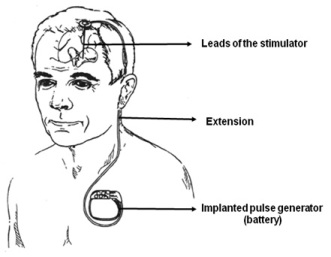Deep Brain Stimulation
What is Deep Brain Stimulation?
Deep Brain Stimulation is a type of brain surgery used to improve the control of movement in patients with movement disorders. The deep brain stimulation procedure attempts to block the abnormal activity of neurons that cause debilitating neuromuscular problems. DBS is not a cure for any disease. The goal of DBS is to help control symptoms of the condition, such as improving the control of movement, to help to provide a better quality of life.
How is DBS done?
 The procedure involves implanting thin wires with attached electrodes into specific areas of the brain. Certain parts of the brain control different parts of the body. Based on the disorder and detailed information about the patient’s symptoms, the surgical team determines where the electrodes will be placed.
The procedure involves implanting thin wires with attached electrodes into specific areas of the brain. Certain parts of the brain control different parts of the body. Based on the disorder and detailed information about the patient’s symptoms, the surgical team determines where the electrodes will be placed.
The wires run from the electrodes under the skin and connect to a small pulse generator, similar to a heart pacemaker, which is placed under the skin of the chest near the collarbone. Several weeks after all implant surgeries are complete, the implanted generator is programmed and adjusted to best control symptoms.
The success of the DBS procedure is highly dependent on the ability of the surgical team to effectively place and program the electrode stimulators. Experience and collaboration is crucial.
Am I a Candidate for DBS?
Deep Brain Stimulation is not appropriate for all patients. The DBS group at University of Colorado Hospital recommends that the following conditions be met:
- You have tried a reasonable course of medications.
- You are significantly disabled from your disease or disorder.
- You are in reasonably good health otherwise.
- You do not require routine MRI scans of the body. Many times CT scans or other studies are acceptable substitutes for MRI studies. MRI in general is contraindicated if you have DBS.
- You can participate in the programming of the device once implanted. This requires you to provide feedback during programming sessions and to attend clinic visits regarding the maintenance of your implant.
- You have no untreated or poorly controlled psychiatric disorder or severe memory problems.
- You have a good support network of family and friends.